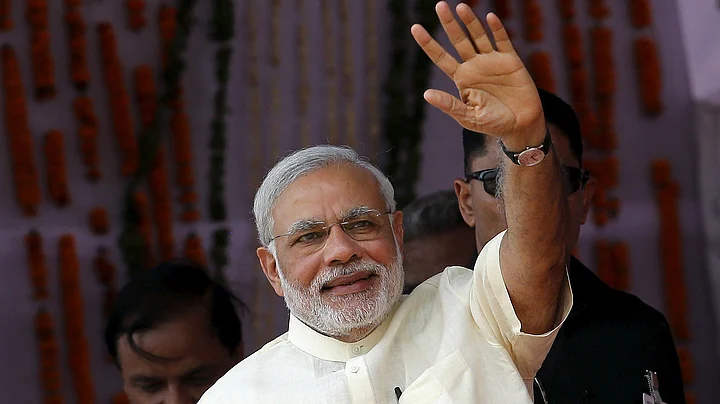At a recent conference in New Delhi, a Palestinian diplomat, while lauding India’s burgeoning relations with Israel, pleaded that India help the two sides reach a just and sustainable peace. The sentiments were a far cry from the days when Palestinians would feel alarmed or uneasy at India’s growing relations with Israel.
They had, after all, watched Arab countries like Egypt and Jordan establish peace and full diplomatic relations with Israel as Qatar and Tunisia also set up business ties with Tel Aviv. Besides this, a host of other Gulf monarchies, including Saudi Arabia, engage covertly with the Jewish state.
No wonder Sushma Swaraj’s recent statement that the Prime Minister would visit Israel sometime later this year should not come as a surprise. The emerging bilateral relationship is based on a perceived quid pro quo: Israel (as well as China and Japan) had stood by Narendra Modi when, as Gujarat Chief Minister, he was shunned by the West. He is expected to return the favour by cementing ties later this year.
In the past, Israel has shared sensitive technology with India, besides acting as an honest broker in acquiring military hardware – the airborne Phalcon AWACS – from the US for supply to New Delhi. The Jewish lobby has played an active and effective role in furthering India-US relations. The nuclear breakthrough with US was in part an outcome of this engagement. The good news, more recently, is that New Delhi’s warm ties with Tehran – Israel’s bitter enemy – has not deterred Tel Aviv.
India established and subsequently upgraded diplomatic relations with Israel under successive Congress governments. Regardless of the fact that West Bengal’s former Marxist Chief Minister Jyoti Basu visited Israel long before Modi, it is only logical for the BJP-led NDA, which favours the Jewish state for many different reasons, to advance the ties.
The close people-to-people ties have become warmer thanks to India’s status as a soft power which has many takers in Israel. Since an increasing number of Indian Muslims are a part of these ties, the argument that relations with Israel will alienate the minority community would be a disservice to the latter.
There is no denying that Muslims, like many non-Muslims, are concerned about the Israeli-Palestinian peace process and during times of heightened tension in that region occasionally take to noisy demonstrations and protests. But such angry demonstrations are a feature of politics in Tel Aviv as well.
And yet the gathering momentum in Track Two and unofficial dialogues between Israelis and representatives of the Indian Muslim community testifies the deepening understanding and mutual trust. The numerous Israeli tourists and other visitors to India move freely across the country, including Muslim-majority Kashmir.
Many Muslim academics, media personalities, representatives of art and culture and students visit Israel. The first Muslim to be elected head of a students’ body in the Hebrew University earlier this year is incidentally an Indian. Numerous Muslims go on pilgrimage to the Al Aqsa mosque – Islam’s third holiest site – and other sites holy to them in Israel. If this facility, while denied to many from other Islamic countries, is available to them, it’s because India has good relations with Israel.
Likewise, the argument that engaging with Israel may impact negatively on Indian expat communities working in Arab countries is also specious. It does a great disservice to the countries which have graciously hosted these communities for decades and have been benefitted by them in turn. Much of the development in the GCC countries has happened because of Indian labour.
Moreover, this argument is oblivious of the dynamics in the region. India upgraded its ties with Israel to full diplomatic recognition only after Egypt and Jordan established diplomatic relations. Other Arab countries like Tunisia, Oman, Morocco and Qatar also have official ties with Israel. Besides, Saudi Arabia, the leader of the Muslim and Arab world, has in recent times engaged with Israel both overtly and covertly. Simultaneously, India continues to pursue bilateral ties with the Palestinians.
With a receding US role in the region, a weakening Europe with its baggage of centuries of anti-Semitism and more recent Islamophobia and inner fissures increasingly marking intra-Arab relations, India could play a stabilising role in the region in future. The recent disclosure that Israeli and Saudi officials have been meeting regularly in different countries, including in India, therefore does not come as a surprise. Bridge-building is more effective than boycotting, and Palestinians are also beginning to acknowledge that.
(At The Quint, we question everything. Play an active role in shaping our journalism by becoming a member today.)
